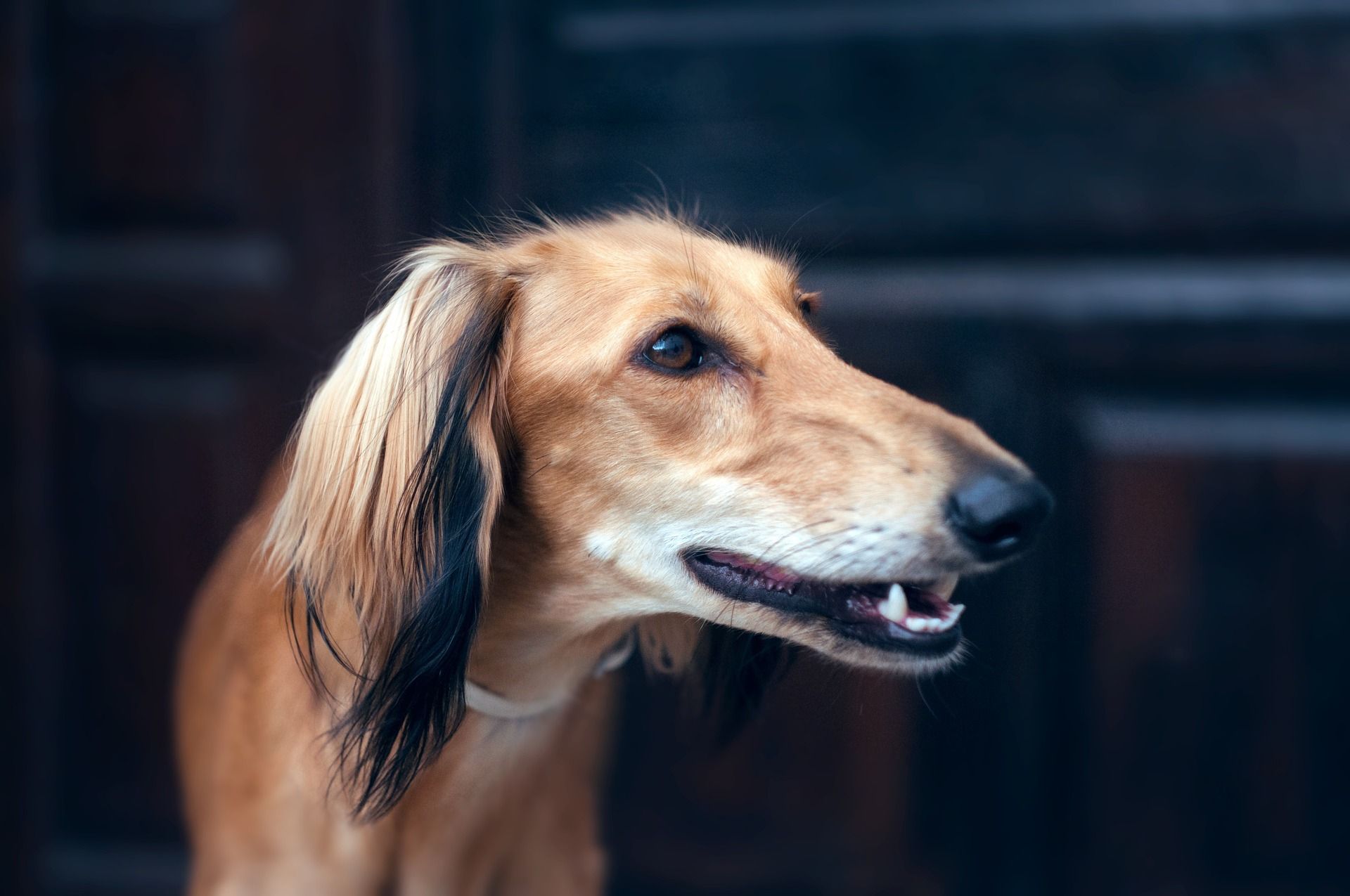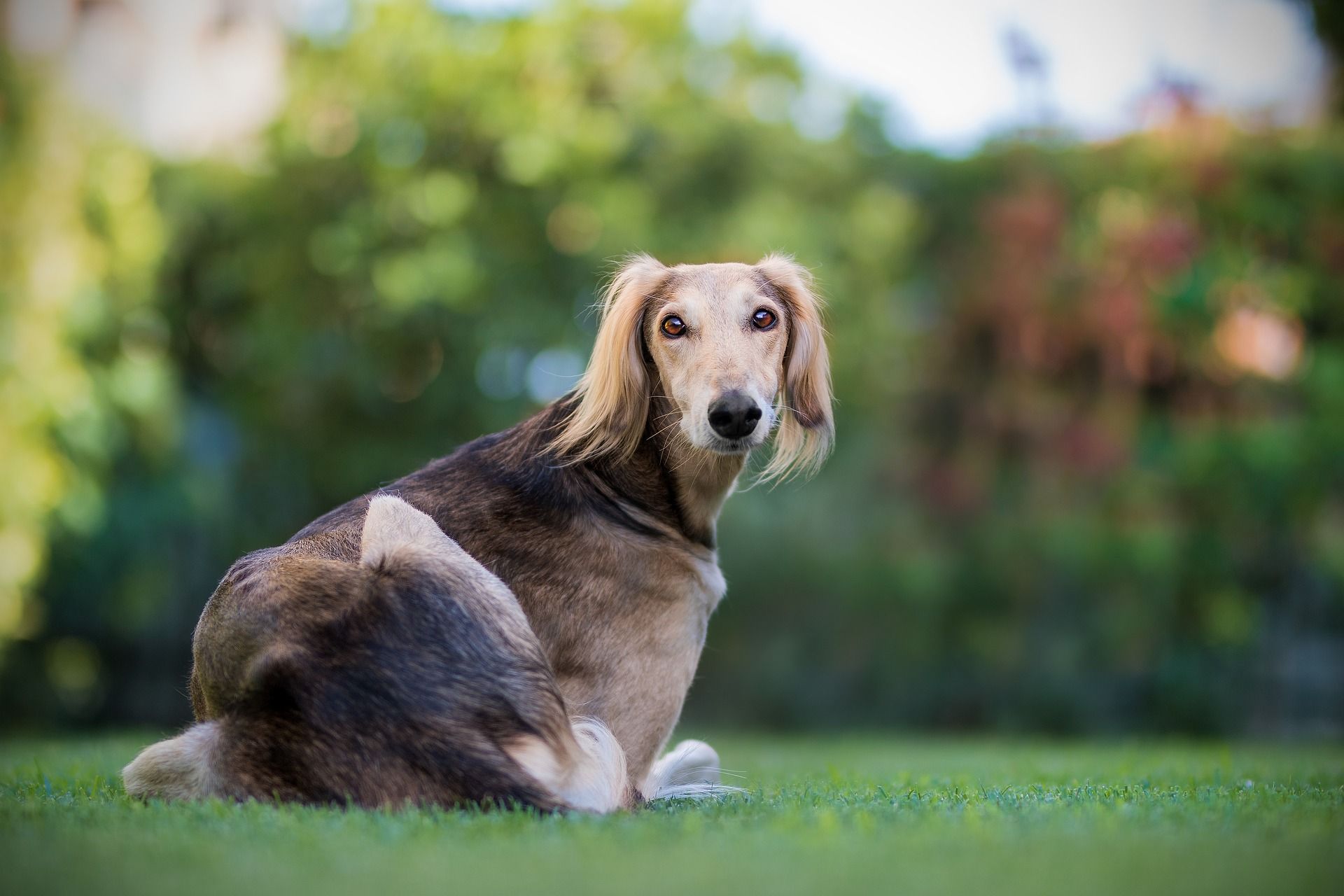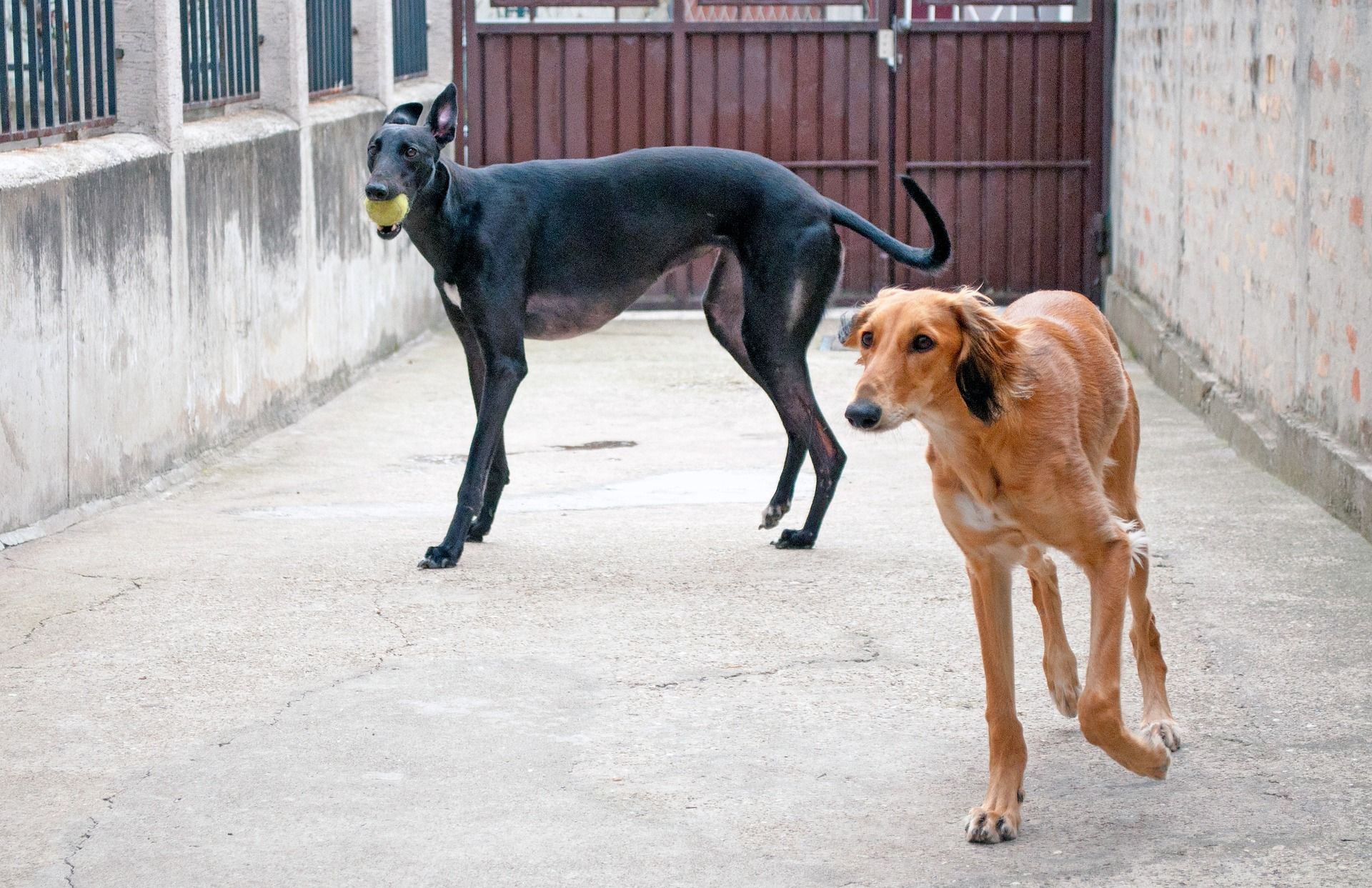Salukis are known for their slender and elegant appearance, and it's not uncommon for them to appear lean. Is your Saluki too skinny? What's the normal weight?

Salukis are known for their slender and elegant appearance, and it’s not uncommon for them to appear lean. However, if you are concerned about your Saluki’s weight or if there has been a sudden and noticeable change in their body condition, it’s essential to consider various factors that could contribute to their leanness.
Table of Contents
-
- #1 — Breed Characteristics
- #2 — High Metabolism
- #3 — Young Age
- #4 — Normal Variation
- #5 — Genetics
- #6 — High Energy Levels
- #7 — Sensitivity to Heat
- #8 — Stress or Anxiety
- #9 — Dental Issues
- #10 — Parasites
- #11 — Gastrointestinal Issues
- #12 — Thyroid Disorders
- #13 — Malnutrition
- #14 — Excessive Exercise
- #15 — Chronic Illness
- #16 — Old Age
- #17 — Inflammatory Bowel Disease (IBD)
- #18 — Cancer
- #19 — Feeding Difficulties
-
How much should a Saluki weight? — Normal weight for a Saluki
-
How do you put weight on a Saluki? — What food puts weight on dogs?
Why is my Saluki so skinny?
If a Saluki appears excessively skinny or experiences sudden weight loss, it is crucial to consult with a veterinarian.
A thorough examination, diagnostic tests, and professional advice can help identify the cause and determine an appropriate course of action to ensure the dog’s health and well-being.
Here are some reasons why a Saluki might appear skinny:
#1 — Breed Characteristics
Salukis are a sighthound breed, historically bred for speed and agility.
Their naturally lean and slender physique is a breed characteristic, emphasizing functionality over bulk. Even when at a healthy weight, Salukis may appear thin compared to more muscular breeds.
#2 — High Metabolism
Salukis typically have a fast metabolism.
This means they burn calories quickly, which can make it challenging for some individuals to maintain a higher body weight. Their metabolism is optimized for bursts of intense activity rather than sustained endurance.
#3 — Young Age
Puppies often have a naturally slim appearance as they go through rapid growth and development. During this phase, their bodies are allocating energy towards growth, and they may appear thin until they reach maturity.
#4 — Normal Variation
Like any breed, Salukis display a range of body types.
Some individuals naturally have a thinner build due to genetic variation within the breed. It’s not uncommon for Salukis to have different body shapes even within the same litter.
#5 — Genetics
Genetic factors play a significant role in a dog’s body structure.
Some Salukis may inherit genes that predispose them to a leaner physique. Genetic diversity within the breed can contribute to variations in size and build.
#6 — High Energy Levels
Salukis are an active and energetic breed.
Dogs with high energy levels may burn more calories, affecting their overall body condition. Regular exercise is essential to keep them fit, but it can contribute to a lean appearance.
#7 — Sensitivity to Heat
In warmer weather, Salukis may reduce their food intake, which can lead to temporary weight loss. Their reduced appetite might be a natural response to heat, and owners should ensure they stay hydrated during such periods.
#8 — Stress or Anxiety
Emotional factors, such as stress or anxiety, can impact a dog’s appetite and eating habits.
Changes in the environment, routine, or the presence of other pets can contribute to stress, affecting the dog’s body condition.
#9 — Dental Issues
Dental problems can cause discomfort while eating, leading to a reduced appetite and weight loss.
Regular dental care, including teeth brushing and veterinary check-ups, is crucial for maintaining oral health.
#10 — Parasites
Internal parasites, such as worms, can affect a dog’s weight by competing for nutrients.
Regular deworming, as recommended by a veterinarian, is essential to prevent or address parasitic infestations.
#11 — Gastrointestinal Issues
Conditions affecting the digestive system, such as inflammatory bowel disease (IBD) or food sensitivities, can lead to poor nutrient absorption and weight loss.
#12 — Thyroid Disorders
Disorders affecting the thyroid gland can impact metabolism and lead to changes in body weight. Hypothyroidism, for example, can result in weight loss.
#13 — Malnutrition
Inadequate nutrition or an unbalanced diet can contribute to weight loss. Ensuring a high-quality, well-balanced dog food is crucial for meeting nutritional needs.
#14 — Excessive Exercise
While regular exercise is essential for a Saluki’s well-being, excessive exercise without sufficient caloric intake can contribute to weight loss.
Balancing activity levels with appropriate nutrition is key.
#15 — Chronic Illness
Underlying health conditions, such as kidney disease, liver disease, or diabetes, can cause weight loss. Chronic illnesses affect the body’s ability to maintain a healthy weight.
#16 — Old Age
Senior dogs may experience changes in metabolism and appetite, leading to weight loss. Aging can also bring about conditions such as dental issues or arthritis, impacting a dog’s ability to eat comfortably.
#17 — Inflammatory Bowel Disease (IBD)
IBD is a chronic inflammatory condition of the digestive tract that can affect nutrient absorption. Dogs with IBD may experience weight loss, diarrhea, and changes in appetite.
#18 — Cancer
Certain types of cancer can lead to weight loss and changes in body condition. Tumors may interfere with nutrient absorption or increase the body’s energy requirements.
#19 — Feeding Difficulties
Competition with other pets during feeding, food aversion, or food allergies can affect a Saluki’s eating habits.
Ensuring a stress-free feeding environment and addressing any food sensitivities is important.
How much should a Saluki weight? — Normal weight for a Saluki
The normal weight for a Saluki can vary based on factors such as age, gender, individual metabolism, and overall health. Salukis are a lean and slender breed, and their weight can fall within a range considered healthy for their size and structure.
Here are general guidelines for the normal weight of Salukis:
Males
- Adult male Salukis typically weigh between 40 to 65 pounds (18 to 29 kg).
Females
- Adult female Salukis generally weigh around 35 to 55 pounds (16 to 25 kg).
It’s important to note that these weight ranges are broad, and individual Salukis may fall outside these averages. Factors such as muscle mass, bone structure, and genetics contribute to variations in weight within the breed.
Assessing Whether a Saluki is a Healthy Weight
To assess whether a Saluki is at a healthy weight, consider the following:
#1 — Body Condition
You should be able to feel your Saluki’s ribs with gentle pressure. The ribs should not be overly prominent, but they should be easily palpable.
#2 — Waistline
When viewed from above, a healthy Saluki should have a visible waistline behind the ribs. The abdomen should tuck up slightly.
#3 — Hipbones
The hipbones should be felt but not excessively prominent. There should be some padding over the hipbones.
#4 — Overall Appearance
A healthy Saluki should have a sleek and athletic appearance with good muscle tone, especially in the hindquarters.
Regular veterinary check-ups are essential for monitoring a Saluki’s weight and overall health.
If you have concerns about your Saluki’s weight, or if you notice sudden changes in weight, it’s advisable to consult with a veterinarian. They can provide personalized guidance on diet, exercise, and overall care to ensure your Saluki maintains an optimal weight for its individual needs.
How do you put weight on a Saluki? — What food puts weight on dogs?
Putting weight on a Saluki, or any dog, should be approached carefully to ensure that the dog gains weight in a healthy and controlled manner.
If you feel that your Saluki is underweight and needs to gain weight, consider the following steps:
- Consult with a veterinarian: Before making any dietary changes or implementing a weight gain plan, consult with your veterinarian. They can assess your Saluki’s overall health, rule out any underlying health issues, and provide personalized advice.
- Adjust diet: Increase the caloric intake by adjusting the dog’s diet. Choose a high-quality dog food that is designed for active or working breeds. Consider a food with a higher fat content to provide additional calories.
- Feeding frequency: Offer more frequent meals throughout the day. Instead of feeding once or twice, consider splitting the daily portion into three or four smaller meals.
- Supplement with healthy additions: Add healthy, calorie-dense supplements to your Saluki’s diet. This could include cooked meats (chicken, beef, or lamb), eggs, and healthy oils (such as olive oil or fish oil). Be sure to avoid foods that may be toxic to dogs.
- Monitor Weight Gain: Regularly monitor your Saluki’s weight to ensure that the weight gain is gradual and controlled. Rapid weight gain can lead to health issues.
- Treats and snacks: Offer healthy treats and snacks between meals. This can include dog-friendly fruits, vegetables, or commercial dog treats. Be mindful of the overall caloric intake.
- Hydration: Ensure that your Saluki has access to clean and fresh water at all times. Proper hydration is essential for overall health.
- Exercise: While it may seem counterintuitive, maintaining regular exercise is important even when trying to put weight on a dog. Exercise helps build muscle mass and contributes to overall well-being.
- Regular vet check-ups: Schedule regular check-ups with your veterinarian to monitor your Saluki’s progress. Adjust the weight gain plan as needed based on your vet’s recommendations.
- Rule out health issues: Ensure that there are no underlying health issues contributing to the weight loss. Parasites, infections, or metabolic disorders can affect a dog’s ability to gain and maintain weight.
Remember that weight gain should be gradual and controlled. Rapid weight gain can lead to other health issues, including digestive upset or obesity.
Always follow your veterinarian’s advice and closely monitor your Saluki’s health throughout the process.
What and how often should you feed a Saluki?
Feeding a Saluki involves providing a balanced and nutritious diet to meet their specific needs, taking into consideration factors such as age, activity level, and overall health. Here are general guidelines on what and how often to feed a Saluki:
What to Feed
- High-quality dog food: Choose a high-quality commercial dog food that is appropriate for your Saluki’s age, size, and activity level. Look for a product with animal-based protein as the primary ingredient.
- Protein: Salukis, like many dog breeds, benefit from a diet rich in animal-based protein. Sources of protein can include chicken, turkey, lamb, or fish. Protein is essential for muscle development and overall health.
- Healthy fats: Incorporate healthy fats into the diet, such as those found in fish oil or olive oil. These fats contribute to skin and coat health and provide additional energy.
- Carbohydrates: Include complex carbohydrates like whole grains (brown rice, quinoa) and vegetables. These provide a source of energy and essential nutrients.
- Fruits and vegetables: Offer dog-safe fruits and vegetables as part of a balanced diet. These can provide vitamins, minerals, and antioxidants. Avoid feeding foods that are toxic to dogs, such as grapes and onions.
- Avoid harmful foods: Ensure that your Saluki does not have access to foods that are toxic to dogs, including chocolate, caffeine, alcohol, and certain artificial sweeteners.
How Often to Feed
- Puppies (up to 6 months): Puppies generally need to be fed more frequently due to their smaller stomach capacity. Feed 3 to 4 meals per day to support their growth and development.
- Adults (6 months and older): Adult Salukis can transition to two meals per day. Some may do well with one large meal, while others may prefer two smaller meals. Adjust the quantity based on their individual needs.
- Senior dogs: As dogs age, their metabolism may change, and they may become less active. Adjust the feeding routine and quantities to accommodate their changing nutritional requirements.
Feeding Schedule Tips
- Consistency: Maintain a consistent feeding schedule. Regular mealtimes help establish routine and can aid in monitoring your Saluki’s appetite and health.
- Portion control: Monitor portion sizes to prevent overfeeding or underfeeding. Adjust the amount based on your Saluki’s weight, age, and activity level.
- Hydration: Ensure that your Saluki has access to clean and fresh water at all times. Proper hydration is essential for digestion and overall health.
- Regular veterinary check-ups: Schedule regular veterinary check-ups to assess your Saluki’s weight, overall health, and nutritional needs. Your veterinarian can provide personalized recommendations.
It’s crucial to tailor your Saluki’s diet to their individual needs.
If you have specific concerns or if your Saluki has unique dietary requirements, consult with your veterinarian for personalized advice. Additionally, be mindful of any changes in your dog’s weight, behavior, or overall health, and adjust their diet accordingly.




